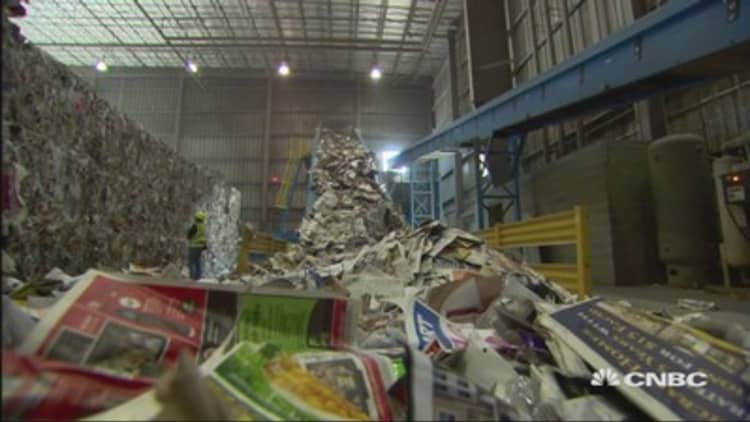
It's hard to find a U.S. customer who doesn't support recycling, but it's also tough to make a buck on the business these days, Waste Management CEO David Steiner said Thursday.
Despite positive signs in much of its business, the waste removal company has come under pressure as recycling commodity prices fell 14 percent in the first quarter of 2015 from the same period a year ago. Waste Management's quarterly revenue fell by $356 million year over year, $70 million of which came from lower recycling receipts.
The United States needs to reconsider how it funds recycling, Steiner said.
"We're not asking for a handout. We're not asking to subsidize recycling, other than when you have situations like you have today, where it becomes unprofitable to recycle," he said on CNBC's "Squawk Box." "And we all know what happens when it becomes unprofitable. People don't invest."
Read More Using smart tech to slash energy bills
While Waste Management generally invests $1 million to $2 million in recycling assets per year, it has not made any investments in the last two years. Steiner said. The problem, he explained, is the company's contracts, which last three to five years, no longer allow the company to make money on recycling based on today's commodity prices.
Cardboard—the most recycled commodity—has typically sold for $100 per ton. Waste Management generally keeps 25 percent from the sale of cardboard and gives its customer 75 percent. It costs the company about $20 to process that cardboard, giving it a roughly $5 profit per ton.
When the price that recycled cardboard fetches falls, Waste Management must still give the customer the agreed-upon 75 percent of the sale price. At that point, it might make just $12.50 from the sale of cardboard, but its processing cost remains the same, leaving it with a loss.
Waste Management is currently changing its contracts so that it recovers its processing costs and then splits what's left, Steiner said, but it must wait for contracts to roll over.
Read More How the sun can make sea water drinkable
"In the meantime, what do you do? You disinvest, right?" he said.
Recycling volume at Waste Management declined 8 percent in the first quarter. Steiner said he expects U.S. recycling rates to fall when the Environmental Protection Agency issues its next report this year. The rate stood at 34.5 percent in 2012.
"As a country, we need to make a decision, right? We need to say, 'Do we want to recycle?' And if we can let's make it viable for the long term."


